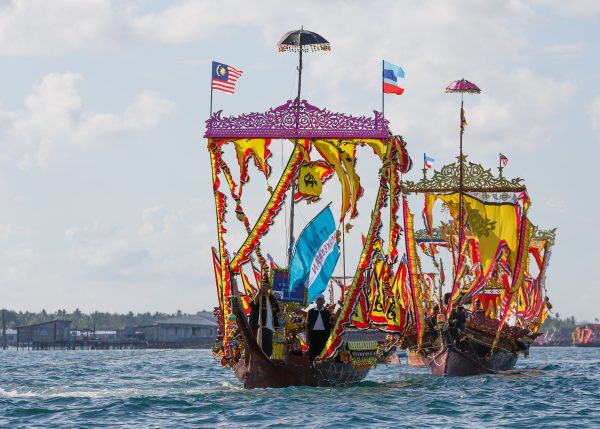A MAN struggles to hold up his tumbling house, which hangs over a cliff after a flood-induced erosion, while he screams, “Quick, call Lee Lam Thye” (pix).
This epic hilarious illustration by Malaysias’ iconic cartoonist Lat is on the cover of the book Call Lee Lam Thye – Recalling a Lifetime of Service.
The cover and the title says it all. The book written by Sofea Chok Suat Ling and P. Selvarani has countless testimonies and tributes to Tan Sri Lee Lam Thye.
Lee was a household name during his political career as the DAP state assemblyman for Bukit Nanas in Selangor (1969 to 1974) and MP for Bukit Bintang (1974 to 1990).
Like a genie out of a bottle, he would magically appear whenever there was a public call for disaster management, most times ahead of the authorities concerned.
As a young politician, Lee carried a manual typewriter, stacks of paper, a portable table and a chair in his car, ready to set up a mobile office wherever he was needed.
His letterhead and signature were so credible that all authorities concerned would support his recommendations for flood victims, housing, employment, hawker licences, pothole repairs, land titles and other bread and butter issues of the downtrodden.
“I had to change to an iPad in the early 2000s when the shopkeeper told me that they don’t sell typewriter red ribbon anymore,” he said.
When his popularity as a public saviour was at its peak, Lee suddenly announced his unexpected decision to quit politics, just before the 8th general elections in 1990.
His resignation made headlines and shocked supporters, who were expecting a strong performance by DAP candidates.
Against the onslaught of rumours and speculations, Lee was dignifiedly silent without any countenance on criticisms raised.
In June this year, he launched his book unravelling why he quit politics, after 32 years of silence on the matter.
“I hope this book will put to rest the baseless and vicious rumours regarding my departure from politics.
“It was because I was informed by the party leadership that I would be removed from Bukit Bintang where I had defended for four terms. I did not want to go to a different constituency,” wrote Lee.
He continued to maintain his social service centre in Kuala Lumpur, by joining various agencies to champion and resolve several issues that were close to his heart like drug offences, crime prevention, occupational safety, mental health, the city’s drainage and even raising funds for B40 children with life threatening diseases. The list is endless.
Perhaps, he should not have resigned at the significant watershed 1990 election, with an unprecedented historic coalition of opposition parties who saw it timely to deny the ruling party its two-third majority.
Parti Melayu Semangat 46 was formed in 1989 when there was an internal split in Umno creating two factions – Tun Dr Mahathir Mohamad’s Team A and Tengku Razaleigh Hamzah’s Team B.
Semangat 46 aligned with DAP and PAS in two separate coalitions
– Gagasan Rakyat and Angkatan Perpaduan Ummah – to contest in the 1990 general election.
Joseph Pairin Kitingan’s Parti Bersatu Sabah quit BN mid-way during the 1990 general election, betting on Tengku Razaleigh’s coalition to win federal power.
DAP fielded fewer candidates than it did in 1986, primarily to give way to its ally Semangat 46.
Only 57 candidates were put up for the parliamentary election compared with 64 previously.
In the parliamentary election, it won 20 seats, four less than it did in 1986.
This was the first-ever political coalition that DAP entered into with other parties.
It was also mentioned in the book that Lee was a one-party man, and did not join any other political party after he quit DAP, even when former Penang chief minister and then Gerakan president Tan Sri Koh Tsu Koon persuaded Lee to join his party.
Another reason Lee cited for his resignation was that his moderate and non-confrontational style of politics did not sit easily with the DAP’s preference for high octane issues and megaphone espousal.
Lim Kit Siang and Lee might have had their differences. But they should have come to an understanding just before the 1990 election. Who knows?
The coalition contestants could have led Malaysia on a different path altogether, perhaps with a two-party system of check and balance.
So when contestants come knocking at our doors with various colourful scripts we must know their track record of community work before we endorse them.
He or she should be a person with a worthy cause, a doer of deeds and has a real passion for the people.
In essence, the one clear moral message in “Call Lee Lam Thye”, is that a real representative should be one who people want to call confidently when they are in distress.
Comments: [email protected]





.jpg)


